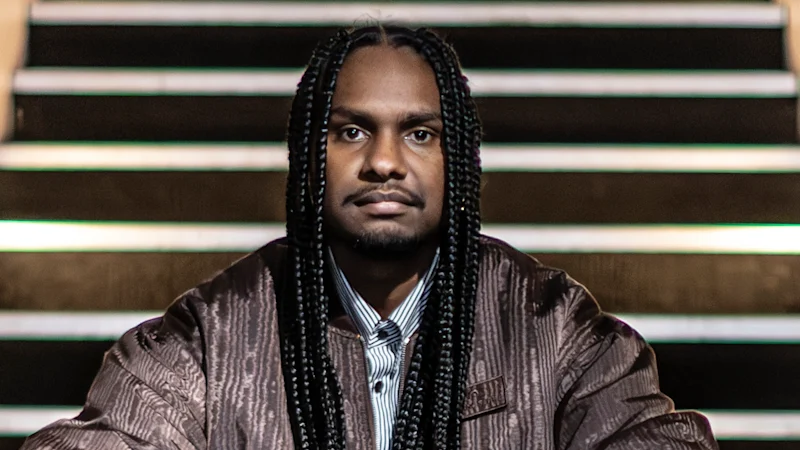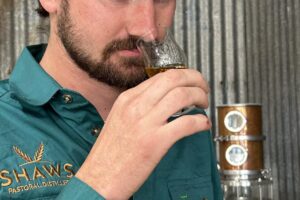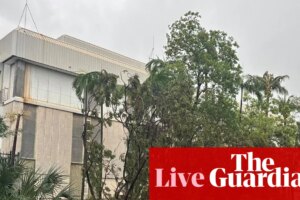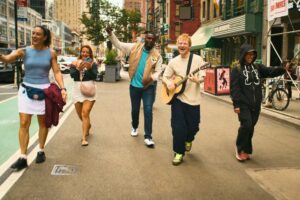
Normal text sizeLarger text sizeVery large text size
In the beginning was Djandjay “Daisy” Baker. Long before her grandson Danzal was born, she was the first Yolngu woman, local legend goes, to marry a balanda. Off they flew on their honeymoon. Hawaii. Miami. Planet hip-hop. What they brought back changed Arnhem Land forever.
That’s the opening montage in Baker Boy’s origin story. When the breakdancing kid from Milingimbi and Maningrida released his ARIA-sweeping Gela album in 2021, his grandmother’s well-worn Grandmaster Flash cassette and Fred Astaire VHS were part of his lore as the hottest rap-party boy in the land.
That was then. “I’m an angel but I could be a killer,” he raps on his second album, Djandjay. “I became a dragon from a caterpillar.”
“I named the record after my late grandmother, who was the matriarch in the family, because I’ve inherited her boisterous energy, the ‘no shame, be proud’ [attitude], always encouraging people around her to get up and dance,” he says.
“This new project was definitely a lot about finding myself, finding a new sound, finding a way through music. It’s like trying out different outfits, different genres; punkiness, craziness, some electronics, just sonically trying to elevate from Gela.”
Sitting in the green room of an empty Melbourne theatre, Danzal Baker certainly presents as a new man. The whole country saw him reborn two weeks ago, gleaming in head-to-toe white at his commanding AFL grand final performance. No breakdancing. Just standing tall and declaiming. Not a silent soldier, my pigment is my pride, I’m like red dirt, gold chains, blak knight, thick skin.
“Thick Skin I wrote after the referendum result came out,” he explains, referring to 2023’s defeated motion for an Indigenous voice to parliament. “I was in the middle of working on the record, and when that happened, the atmosphere was heavy and dark and eerie and it was just killing the vibe.”
His producers Pip Norman and Rob Amoruso suggested he “just write music, get all these feelings out. And it ended up sounding so sick,” he says — even before they marshalled that spine-tingling choir: Thelma Plum, Emma Donovan, Kee’ahn and Jada Weazel. “The first time I heard it I got teary, full goosebumps,” Baker says.
War Cry is another soldier’s tale, inspired not by the #BlackLivesMatter movement as such but by the shortsighted response closer to home. “I know what it’s like to be a trending topic,” he says, “and it does not feel great. I got lots of messages saying, ‘Why are you not using your platform? You’re not saying anything!’”
He shakes his head. “It’s very uncomfortable to even try to come up with a statement about something that’s happening over in the US, when people should also be recognising that we have issues in our own backyard with Black deaths in custody.”
“I want to take my language everywhere. Not just to teach it, but to share the pride of it,” says Baker Boy.Credit: Jason South
The personal toll of that pressure is on the record too. With verses from Minneapolis rapper Pardyalone, Running Low paints a hectic picture of road burnout, fickle friends and sky-high expectations. “The bottom side of those ARIAs [Gela won six] is there’s a couple of pointy bits you gotta watch out for,” Baker says, laughing.
But it’s the general attack of the album — heavier sonics, lyrics pressing harder and faster against the beat — that propels Djandjay forward. And while king-hitters like Ziggy Ramo, Briggs and Yirrmal bring muscle from all over the continent, Baker Boy’s secret weapon remains the power of his own tongue, and the very act of using it.
“In Djandjay I’m rapping in three languages: my father’s language, my mother’s language and English,” he says. “I was going crazy, writing lyrics in the studio and being like, ‘What the heck did I just write? This is insane!’
“I know people that don’t understand what I’m saying, but I know for a fact that family back home, when they hear it, they go, ‘WHAAAAT?’” He slaps his knees, collapses in laughter. “For them it’s a mic-drop moment, that sort of vibe.”
The electrifying sound of his Yolngu and Burarra rapping speaks to the essence of Baker Boy’s mission, and the fine line it walks between a world that measures success in ARIA Awards and the aspirations he holds for the community he still calls home.
“I want them to [realise] that they can 100 per cent be better than me,” he says. “I want them to see me and go, ‘If he can do it, I want to do it. We’re also talented. We shouldn’t be worrying about having English as a second or third language. We can still thrive, and we can still secure our dreams’.”
Baker Boy, pictured at the ARIAs in 2022, with the ARIA award for album of the year for Gela.Credit: Hanna Lassen/Getty
At school in Milingimbi and Maningrida, “English was one of my weak points,” Baker reveals. He laughs about memorising sentences he could roll out to impress his classmates. The learning curve continued at Shalom Christian College in Townsville, where Indigenous kids from all over the country brought more languages still.
“I was kind of the quiet kid, but I still had a few words that I knew how to basically navigate through everything. But having a lot of people around me that spoke in English helped … especially when they were mob themselves.”
Those years – boarding school, dance classes, leadership programs, working with the North Queensland Cowboys’ school incursions, “Year 13” courses in panel beating, construction and health – widened his sense of possibility. But the power of communication kept calling.
“I look at all the other cultures, the Japanese pop or the K-pop or Desipop and all that stuff. When you hear some of them rapping in their native tongue you go, ‘Yeah, that’s it’. Spanish rappers and stuff? That’s dope. That stuff inspires me,” he says.
He remembers playing the Riddu Riddu Sami festival in Manndalen, Norway, back in 2018. “One of the things that freaked me out was learning that in their school curriculum, they talk about Indigenous Australians! And I’m just like, ‘What?’ We need more people talking about Indigenous culture in school curriculums in Australia.”
He shares a dream that maybe Arnhem Land’s Garma Festival might similarly expand its sights some day. “It would be so sick to have a lot of Indigenous people from around the world to come in and show off their cultures. That’d be epic.”
Loading
He’s ambitious for Djandjay, like any artist would be on the eve of their second album. But beyond the inevitable considerations of chart success and festival stages, his true goals seem simultaneously more grounded and much, much bigger.
“With the Gela record, Baker Boy is all happy, exciting, dancing, always positive, always bringing people together and stuff. On Djandjay, I want to show that I’m human. I can show emotion. I can be vulnerable, I can be angry, be proud and be comfortable in my own skin,” he says.
“I want to make sure everyone can hear it like that, and go ‘Wow, Australia! There’s heaps of languages there’, and be proud of one of the oldest living cultures in the world. I want to take my language everywhere. Not just to teach it, but to share the pride of it. The way my grandmother taught me.”
Baker Boy’s Djandjay is out on Friday.





